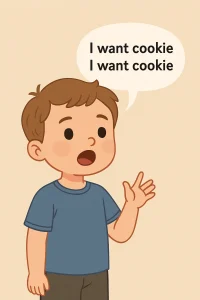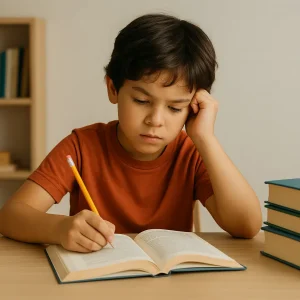How to Improve Your Child’s Language Skills with Music
By Wellness Hub
Last Updated: December 10, 2024
Have you noticed how easily a catchy tune and its lyrics stick in your mind? This isn’t just an earworm it showcases music’s powerful impact on our memory and cognitive skills, essential for language development. From infancy, children’s exposure to music through lullabies and playful songs doesn’t just entertain it lays foundational bricks for language skills. By integrating music into educational and therapeutic settings, we can enhance linguistic abilities naturally and enjoyably. Let’s explore how simple musical interactions can significantly boost language learning in the sections ahead.
The Science Behind Music and Language Skills
How Music Influences Brain Development
Listening to music activates nearly every part of the brain, especially those involved in processing sounds, emotions, and language. This broad stimulation supports critical language skills by creating neural pathways that improve auditory discrimination—our ability to hear differences in sounds. This enhancement is crucial for developing speaking and reading abilities.
Benefits of Music for Verbal Development
Engaging with music has notable benefits for verbal development. Studies show that children who participate in musical activities tend to have better vocabulary and syntax skills. For example, a 2019 study found that preschoolers involved in interactive music activities had an improved understanding of word meanings and sentence structure.
Music also aids in memorizing and recalling information through rhythmic repetition, making it easier to remember and use new words. Additionally, exposure to music boosts both expressive and receptive language skills, enhancing overall communication abilities.
Benefits of Music for Verbal Development
| Benefit | Description |
| Enhanced Vocabulary | Music helps children learn new words and expand their vocabulary through repetitive and catchy lyrics. |
| Improved Syntax | Songs structure sentences in a way that mimics conversational speech, aiding grammatical development. |
| Better Listening Skills | Musical activities require careful listening, which enhances overall auditory processing capabilities. |
Practical Tips to Use Music for Language Enhancement
1. Everyday Activities to Integrate Music and Language
Integrating music into your daily routine can be one of the most enjoyable ways to enhance language skills in children. Here are some simple, fun activities that you can easily incorporate at home to mix music with language learning:
- Sing-along Sessions: Choose songs with repetitive and simple lyrics that encourage your child to sing along. This repetition can help them learn new words and phrases while improving their pronunciation and rhythm in speech.
- Music and Movement Games: Games like ‘Freeze Dance’ can be adapted to include language learning. Play music and have children freeze when the music stops, and use that moment to encourage them to name a body part, action, or object you point to or ask about.
- Story Songs: Create or find songs that tell a story. As the song progresses, pause and ask your child to predict what might happen next or describe the characters. This not only enhances listening skills but also boosts verbal expression and creativity.
2. Choosing the Right Type of Music
Not all music offers the same benefits for language development, so selecting the right type can make a significant difference. Here are some guidelines on choosing music that can help enhance language skills:
- Lyric Simplicity and Clarity: Opt for songs with clear lyrics and simple vocabulary. Children’s songs or nursery rhymes are great because they are often designed to be linguistically accessible to young listeners.
- Slow to Moderate Tempo: Music with a slower pace allows listeners to discern words and phrases more clearly, making it easier for children to follow along and understand.
- Cultural Diversity: Incorporate songs in different languages or from various cultural backgrounds. This exposure not only enhances language skills but also broadens cultural understanding.
Types of Music for Language Development
| Type of Music | Characteristics | Example |
|---|---|---|
| Children’s Songs | Simple lyrics, repetitive, clear pronunciation | “The Wheels on the Bus” |
| Classical Music | Complex structures, instrumental, stimulates cognitive processes | Mozart’s Symphony No. 40 |
| Cultural Music | Introduces diversity, different languages | “La Cucaracha” (Spanish) |
3. Interactive Musical Games for Language Skills
Games that combine music and language learning can significantly boost children’s verbal abilities. Here are some interactive musical games that are both educational and entertaining:
- Musical Sentence Forming: Use a drum or clapping to create a rhythm, and have children come up with a sentence that matches the beat. This helps with their syntactic development and rhythmic timing.
- Rhyme Time: Play songs that emphasize rhyming words, then pause and ask the child to think of other words that rhyme with the last word heard. This game enhances phonemic awareness and is fun for kids.
- Song Story Creators: After listening to a song, have children create a short story based on the lyrics. This encourages them to process what they hear and express it in their own words, enhancing comprehension and creative thinking.
Conclusion
Music isn’t just enjoyable—it’s a powerful tool for enhancing language skills. Integrating music into your daily routines can boost memory, improve pronunciation, and make learning languages fun. At Wellness Hub, we provide resources that make combining music and language learning effortless and effective. Explore our tools and let each note enhance your communication abilities. Ready to make language learning a musical journey? Visit our resources page for more information and start harmonizing your language skills today! Let’s turn up the music and let language skills soar!
Frequently Asked Questions:
1. How does music benefit language development in children?
Music stimulates areas of the brain associated with language processing, helping to improve vocabulary and syntax through rhythmic patterns and sound recognition.
2. Can music really improve a child’s ability to learn new words?
Yes, music can significantly help children learn new words by enhancing memory and making the learning process enjoyable and memorable.
3. What types of music are best for language development?
Children’s songs, nursery rhymes, and any music with clear lyrics and a slow to moderate tempo are great for language learning.
4. How often should I integrate music into my child’s learning routine?
Incorporating music daily, even if only for a few minutes at a time, can be very effective in supporting language development.
5. Are there specific musical activities that help with language skills?
Yes, activities like sing-alongs, rhyme games, and storytelling through song are excellent for enhancing language skills.
6. Can music help a child with speech delays?
Absolutely, music therapy is often used to help children with speech delays improve their verbal abilities and communication skills.
7. What is the best age to start using music for language learning?
It’s never too early to start; even infants can benefit from musical exposure, which can support early word recognition and sound differentiation.
8. How can I use music to help my child with language homework?
Try setting vocabulary words to melodies or using songs related to the homework theme to enhance recall and engagement.
9. Does playing an instrument help with language development?
Playing an instrument can improve various cognitive skills including attention, memory, and language comprehension.
10. Where can I find resources for music-based language activities?
Check out Wellness Hub for a range of educational materials and activities designed to integrate music and language learning effectively.
About the Author:
Rajini Darugupally
M.Sc., Speech-Language Pathologist (9+ years of experience)
Rajini is a passionate and dedicated Speech-Language Pathologist with over 9+ years of experience, specializing in both developmental speech and language disorders in children and rehabilitation in adults. Currently, at Wellness Hub, she thrives in a team environment that values innovation, compassion, and achieving results for their clients.
Book your Free Consultation Today
Parent/Caregiver Info:
Client’s Details:
* Error Message








